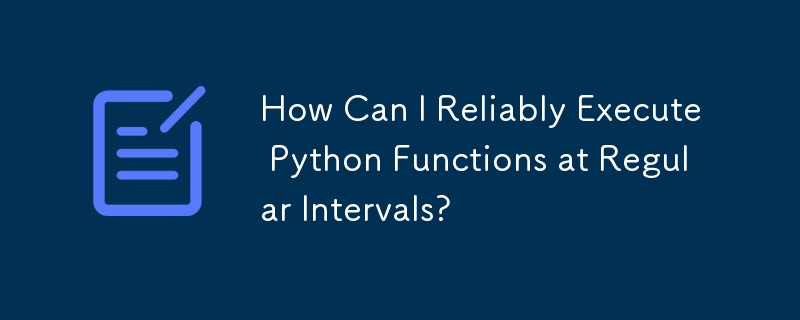 Backend Development
Backend Development
 Python Tutorial
Python Tutorial
 How Can I Reliably Execute Python Functions at Regular Intervals?
How Can I Reliably Execute Python Functions at Regular Intervals?
How Can I Reliably Execute Python Functions at Regular Intervals?

Executing Functions Regularly in Python
Executing a function repeatedly at specified intervals is a common task in programming. Python provides various approaches to achieve this, one of which is the time module. However, the simple while loop approach mentioned in the question may face some unexpected challenges.
Potential Issues with the While Loop Approach:
The while loop code effectively pauses the program for 60 seconds in each iteration. This can lead to problems if the function being executed requires immediate execution. For instance, if the function processes real-time data, the 60-second delay can result in significant data backlog.
Alternative Approach: Using the sched Module
As an alternative to the while loop, the sched module provides a more robust event scheduling mechanism. Here's how you can use it:
import sched, time
# Define the callback function
def do_something(scheduler):
# Schedule the next call
scheduler.enter(60, 1, do_something, (scheduler,))
print("Doing stuff...")
# Execute the actual task
# Create a scheduler
scheduler = sched.scheduler(time.time, time.sleep)
# Schedule the first call
scheduler.enter(60, 1, do_something, (scheduler,))
# Run the event loop
scheduler.run()In this approach, the do_something function is scheduled to execute every 60 seconds. The scheduler.enter() method schedules the function with a delay of 60 seconds and a priority of 1, ensuring that it will be executed as soon as possible without blocking other events.
Using Existing Event Loop Libraries
If your application already employs an event loop library, such as asyncio or tkinter, you can leverage its built-in scheduling capabilities instead of using the sched module. This ensures compatibility with your existing event loop mechanism and avoids potential conflicts.
The above is the detailed content of How Can I Reliably Execute Python Functions at Regular Intervals?. For more information, please follow other related articles on the PHP Chinese website!

Hot AI Tools

Undresser.AI Undress
AI-powered app for creating realistic nude photos

AI Clothes Remover
Online AI tool for removing clothes from photos.

Undress AI Tool
Undress images for free

Clothoff.io
AI clothes remover

Video Face Swap
Swap faces in any video effortlessly with our completely free AI face swap tool!

Hot Article

Hot Tools

Notepad++7.3.1
Easy-to-use and free code editor

SublimeText3 Chinese version
Chinese version, very easy to use

Zend Studio 13.0.1
Powerful PHP integrated development environment

Dreamweaver CS6
Visual web development tools

SublimeText3 Mac version
God-level code editing software (SublimeText3)

Hot Topics
 How to solve the permissions problem encountered when viewing Python version in Linux terminal?
Apr 01, 2025 pm 05:09 PM
How to solve the permissions problem encountered when viewing Python version in Linux terminal?
Apr 01, 2025 pm 05:09 PM
Solution to permission issues when viewing Python version in Linux terminal When you try to view Python version in Linux terminal, enter python...
 How to avoid being detected by the browser when using Fiddler Everywhere for man-in-the-middle reading?
Apr 02, 2025 am 07:15 AM
How to avoid being detected by the browser when using Fiddler Everywhere for man-in-the-middle reading?
Apr 02, 2025 am 07:15 AM
How to avoid being detected when using FiddlerEverywhere for man-in-the-middle readings When you use FiddlerEverywhere...
 How to efficiently copy the entire column of one DataFrame into another DataFrame with different structures in Python?
Apr 01, 2025 pm 11:15 PM
How to efficiently copy the entire column of one DataFrame into another DataFrame with different structures in Python?
Apr 01, 2025 pm 11:15 PM
When using Python's pandas library, how to copy whole columns between two DataFrames with different structures is a common problem. Suppose we have two Dats...
 How to teach computer novice programming basics in project and problem-driven methods within 10 hours?
Apr 02, 2025 am 07:18 AM
How to teach computer novice programming basics in project and problem-driven methods within 10 hours?
Apr 02, 2025 am 07:18 AM
How to teach computer novice programming basics within 10 hours? If you only have 10 hours to teach computer novice some programming knowledge, what would you choose to teach...
 How does Uvicorn continuously listen for HTTP requests without serving_forever()?
Apr 01, 2025 pm 10:51 PM
How does Uvicorn continuously listen for HTTP requests without serving_forever()?
Apr 01, 2025 pm 10:51 PM
How does Uvicorn continuously listen for HTTP requests? Uvicorn is a lightweight web server based on ASGI. One of its core functions is to listen for HTTP requests and proceed...
 How to handle comma-separated list query parameters in FastAPI?
Apr 02, 2025 am 06:51 AM
How to handle comma-separated list query parameters in FastAPI?
Apr 02, 2025 am 06:51 AM
Fastapi ...
 How to solve permission issues when using python --version command in Linux terminal?
Apr 02, 2025 am 06:36 AM
How to solve permission issues when using python --version command in Linux terminal?
Apr 02, 2025 am 06:36 AM
Using python in Linux terminal...
 How to get news data bypassing Investing.com's anti-crawler mechanism?
Apr 02, 2025 am 07:03 AM
How to get news data bypassing Investing.com's anti-crawler mechanism?
Apr 02, 2025 am 07:03 AM
Understanding the anti-crawling strategy of Investing.com Many people often try to crawl news data from Investing.com (https://cn.investing.com/news/latest-news)...





